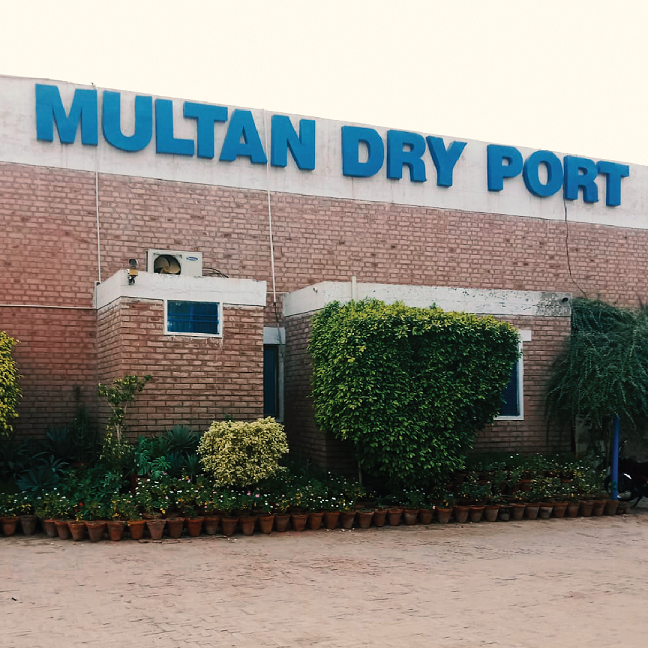The first Dry Port Trust of South Punjab was established 28 years ago in the region of Sher Shah near Multan. Its purpose was to provide facilities for industrialists and traders in the Vehari area.
It was anticipated that providing customs clearance facilities in Multan for industries and importers from Multan, Dera Ghazi Khan, and Bahawalpur would increase imports and exports, creating new employment opportunities for the people.
Unfortunately, this could not happen, and the dry port has been 'semi-active' since 1995 until now.
Initially, stakeholders worked enthusiastically, but now, the revenues and profits are decreasing daily. To the extent that even covering the expenses of the administration has become a challenge for the dry port.
All Pakistan Bedsheet and Upholstery Manufacturing Association's Chairman, Syed Muhammad Asim, reveals that there was a time when more than 500 containers of imported goods were cleared monthly in Multan. However, now this number has dwindled to just 50 containers per month.
The data from the last three years verifies that there has been a daily decrease in both income and revenue from here.
In the financial year 2020-21, 539 containers were cleared at Multan Dry Port with a value of Rs 10 billion 92 crores and 58 lakh.
Additionally, one thousand 584 containers of goods were imported from here, estimated at Rs 59 crores and 57 lakh.
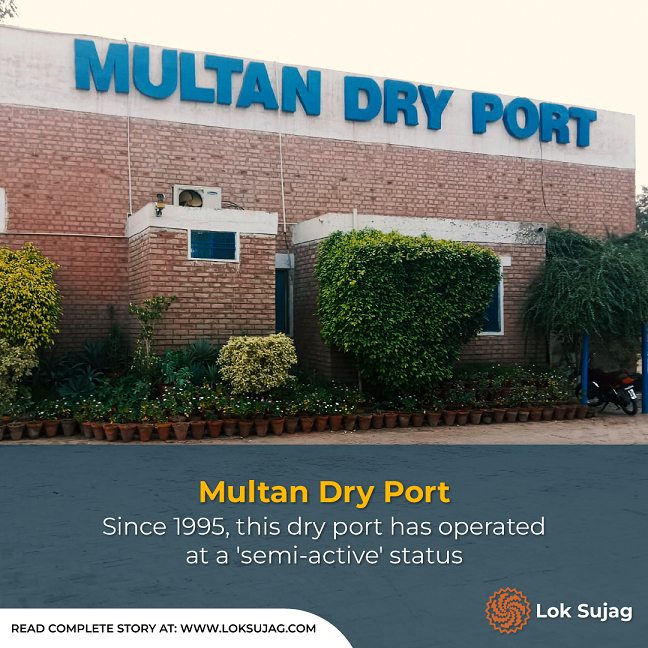
In the financial year 2021-22, 261 containers arrived from abroad at Multan Dry Port, valued at Rs 4 billion, 21 crores and 12 lakh. Simultaneously, 887 containers were sent abroad with an estimated value of Rs 75 crore and 90 lakh rupees.
During the financial year 2022-23, 139 inbound containers were cleared at Rs. 4 billion, 49 crores and 34 lakh. Simultaneously, 851 containers were imported with goods estimated at Rs 52 crores, 98 lakh and 51 thousand.
During the current financial year, in the first five months until December, 91 containers were imported, while 445 containers were sent abroad.
Muhammad Asim told Lok Sujag that Multan Dry Port faces challenges due to government policies. A few years ago, the Customs Collectorate was divided into two parts, 'Appraisement (valuation)' and 'Enforcement,' assigning Multan Dry Port under Customs Appraisement.
He says that Multan is part of the Faisalabad Customs Collectorate, and the Collector Customs Appraisement Faisalabad office is situated here. Any issues the industrialists face require them to go to Faisalabad, leading to increased problems.
I am the trustee of Multan Dry Port, but I prefer to clear my income and revenue shipments from Karachi because the customs staff here takes a lot of time to clear them.
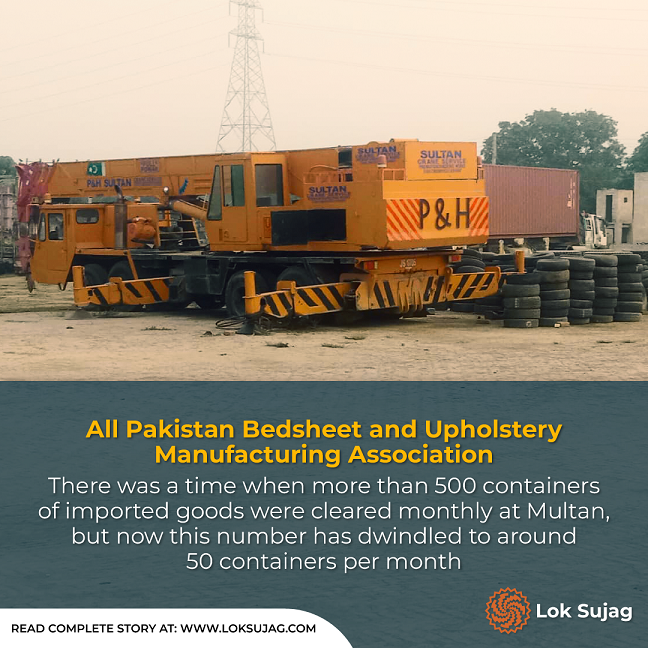
Multan Dry Port imports grey fabric, cotton yarn, home textiles (bedsheets, curtains, etc.), shoes, leather jackets, and other manufactured goods.
Similarly, imports include industrial machinery, raw materials, computers, IT equipment, machine oil, metal strips, hydrocarbon, agricultural medicines, and machinery, among 20 items. However, imports of raw materials for food factories and textiles have faced challenges in the last six months due to fluctuations in the dollar.
The Customs Appraisement has appointed staff for customs clearance at Multan Dry Port, including an Assistant Collector, Principal Appraiser, three Appraisers, three Examiners, three Inspectors, and other office staff. The port also has a staff from the Anti-Narcotics Force (ANF) that investigates consignments.
Muhammad Asim says there is a lack of modern scanners for container checking at Multan Dry Port. As a result, the Anti-Narcotics Force (ANF) has to open and inspect loaded and ready containers manually. This process leads to the destruction of packaging and complaints from international customers.
"We have to bear losses when shipments are tampered with. The facility of modern scanners is only available at Karachi and Lahore dry ports, where additional charges are incurred; however, the trader doesn’t have to go through a manual search.”
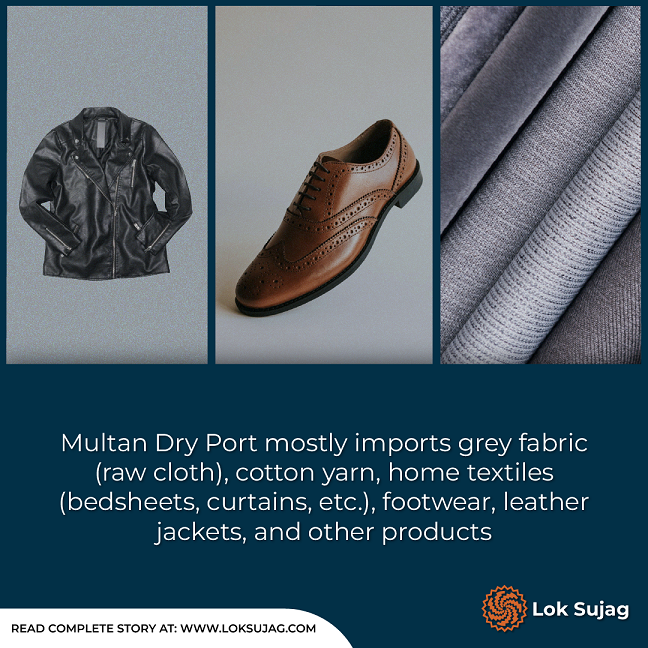
An industrialist in Multan, who prefers to remain anonymous, produces textiles here and exports them abroad.
He not only laments the manual search of containers but also complains about unnecessary objections on Goods Declaration (GD) during clearance at Multan Dry Port.
Another prominent industrialist, on the condition of anonymity, reveals that when he clears consignments from Karachi Port, he only has to pay taxes to the Sindh government, besides duties. However, both the Sindh and Punjab governments demand payment for clearances from Multan, reiterating that he cannot pay duplicate taxes.
Industrialist Muhammad Hussain Kushkoha says that much time is wasted here. With its web-based (WEBOC) system, Karachi Port ensures quick clearance, while Multan Dry Port operates under Karachi's jurisdiction through an online system. The issues faced in Multan are not encountered in Karachi.
Clearing agent Waqar Shah Bukhari says that the WEBOC clearance system's main server downtime in Multan also halts Goods Declaration (GD), causing importers to sometimes face demurrage charges.
He says that issues escalate if under-invoicing or mis-declaration occurs at a small port, so people prefer clearing their goods at larger ports.
Also Read
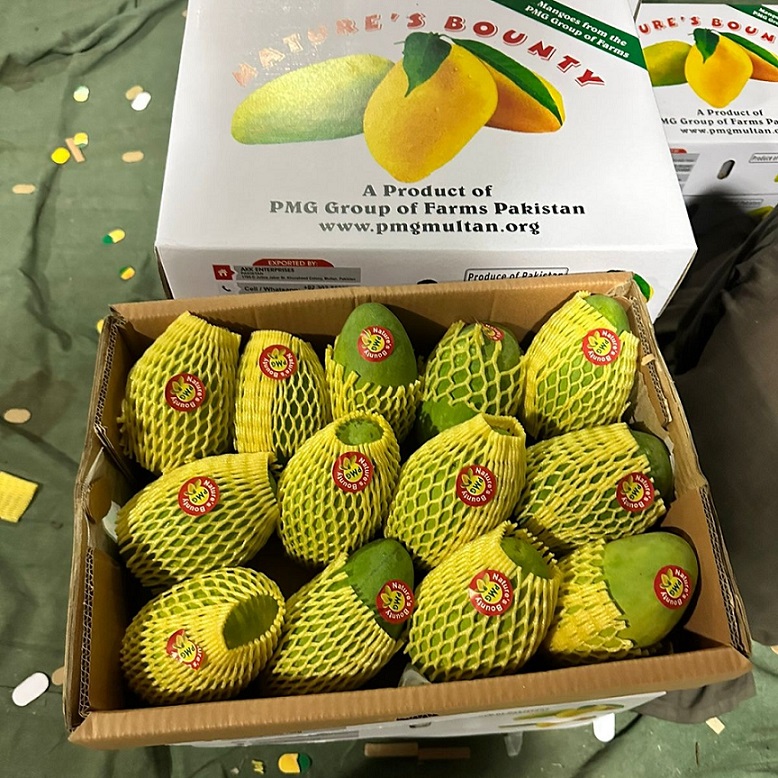
From Multan to Iran: Impact of mango export bans on farmers and exporters
Collector Appraisement Faisalabad, Asdaq Afzal, acknowledges that industrialists' concerns regarding clearance at Multan Dry Port have reached him. Now, efforts are being made to resolve the issues through Zoom meetings, and he aims to be present at Multan Dry Port for two days every week.
President of the Multan Chamber of Commerce and Industry (MCCI), Mian Rashid Iqbal, perceives infrastructure as a major weakness at the Dry Port.
He says that the port's crane has been dysfunctional for a while, but there are no resources for its repair. Bringing a container handling crane costs from ten to twenty thousand.
The continuous decline in revenues at Multan Dry Port has led to the administration's termination of over 20 employees. Only 22 individuals are working, and temporary labourers are hired as needed.
Local industrialist Chaudhry Zulfiqar Anjum attributes the 'failure' of Multan Dry Port to the trustees and claims that it is under the control of 'one family.'
However, General Manager Multan Dry Port, Khawaja Hasan Wadood, refutes these 'allegations.' He states that when an industrialist is not interested in the affairs of Multan Dry Port Trust, they cannot forcefully make them a trustee of the Dry Port.
Mahmood Ahmed Khan served at Multan Dry Port for seventeen years and has now retired as Principal Appraiser. He explains that industrialists prefer not to clear their goods through Multan due to increased scrutiny and manual inspection during the checking process.
“Despite the chaos in Karachi, it offers better clearance facilities. On the other hand, those clearing through Multan Dry Port often experience preferential treatment issues.”
The Federal Industrial and Commerce Council Executive Member, Malik Suhail Talat, says Karachi and Central Punjab are industrial hubs. Only in Lahore city are traders and industrialists successfully operating through four dry ports.
Southern Punjab is primarily an agricultural region, lacking industries. Creating facilities here should be paramount for the government.
Published on 22 Jan 2024
